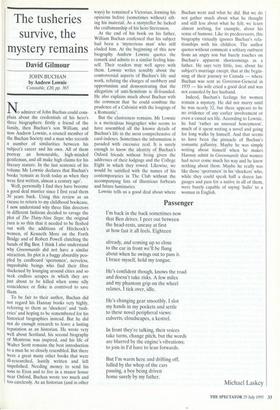The tusheries survive, the mystery remains
David Gilmour
JOHN BUCHAN by Andrew Lownie Constable, £20, pp. 365 No admirer of John Buchan could com- plain about the credentials of his hero's
three biographers: firstly a friend of the family, then Buchan's son William, and now Andrew Lownie, a council member of the Buchan Society and a man who records a number of similarities between his subject's career and his own. All of them portray an honourable, high-minded gentleman, and all make high claims for his literary stature. In the last sentence of his volume Mr Lownie declares that Buchan's books 'remain as fresh today as when they were first written, almost a century ago'.
Well, personally I find they have become a good deal mustier since I first read them 30 years back. Using this review as an excuse to return to my childhood bookcase, I now understand why three film directors in different fashions decided to ravage the plot of The Thirty-Nine Steps: the original yarn is so thin that it needed to be fleshed out with the additions of Hitchcock's women, of Kenneth More on the Forth Bridge and of Robert Powell clutching the hands of Big Ben. I think I also understand why Greenmantle did not have a similar attraction. Its plot is a baggy absurdity peo- pled by cardboard 'sportsmen', nerveless, improbable beings who find their fibre slackened by lounging around cities and so seek endless scrapes in which they are just about to be killed when some silly coincidence or fluke is contrived to save them.
To be fair to their author, Buchan did not regard his Hannay books very highly, referring to them as 'shockers' and `tush- eries' and hoping to be remembered for his historical biographies instead. But he did not do enough research to leave a lasting reputation as an historian. He wrote very well about Scotland, his second biography of Montrose was inspired, and his life of Walter Scott remains the best introduction to a man he so closely resembled. But there were a great many other books that were ill-researched, hastily written and left unpolished. Needing money to send his sons to Eton and to live in a manor house near Oxford, Buchan wrote too much and too carelessly. As an historian (and in other ways) he remained a Victorian, forming his opinions before (sometimes without) sift- ing his material. As a storyteller he lacked the craftsmanship of his hero Stevenson.
At the end of his book on his father, William Buchan confessed that his subject had been a 'mysterious man' who still eluded him. At the beginning of this new biography Andrew Lownie quotes the remark and admits to a similar feeling him- self. Their readers may well agree with them. Lownie writes sensibly about the controversial aspects of Buchan's life and work, refuting the charges of snobbery and opportunism and demonstrating that the allegation of anti-Semitism is ill-founded. He also explains much about Buchan with the comment that 'he could combine the prudence of a Calvinist with the longings of a Romantic'.
But the elusiveness remains. Mr Lownie is a meticulous biographer who seems to have assembled all the known details of Buchan's life in the most comprehensive of card-indexes. Sometimes the information is paraded with excessive zeal. It is surely enough to know the identity of Buchan's Oxford friends without being given the addresses of their lodgings and the College Eight in which they rowed. Likewise, we would be satisfied with the names of his contemporaries in The Club without the accompanying lists of illustrious forbears and future luminaries.
Lownie tells us a good deal about where Buchan went and what he did. But we do not gather much about what he thought and still less about what he felt; we learn almost nothing, for example, about his sense of humour. Like its predecessors, this biography virtually ignores Buchan's rela- tionships with his children. The author quotes without comment a solitary outburst from an angry son but barely touches on Buchan's apparent shortcomings as a father. He says very little, too, about his subject's marriage except, that at the begin- ning of their journey to Canada — where Buchan was sent as Governor-General in 1935 — his wife cried a good deal and was not consoled by her husband.
Indeed, Buchan's feelings for women remain a mystery. He did not marry until he was nearly 32, but there appears to be no evidence of any earlier involvement or even a casual sex life. According to Lownie, he had 'rather an unusual honeymoon', much of it spent writing a novel and going for long walks by himself. And that seems to have been the pinnacle of Buchan's romantic gallantry. Maybe he was simply writing about himself when he makes Hannay admit in Greenmantle that women had never come much his way and he knew nothing about them. Maybe he really was like those 'sportsmen' in his 'shockers' who, while they could speak half a dozen lan- guages and pass for a native in all of them, were barely capable of saying 'hallo' to a woman in English.


















































 Previous page
Previous page